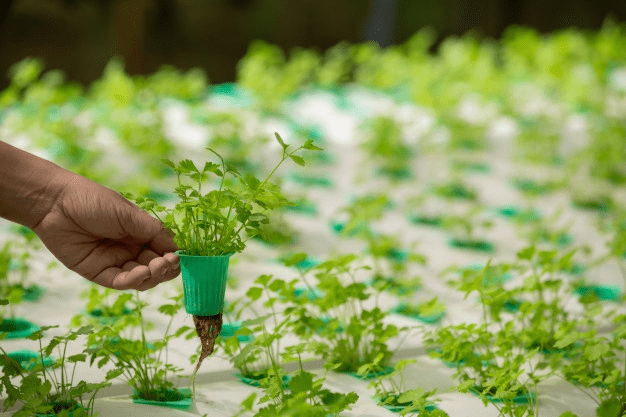
G7’s 50th Summit in Canada Highlights Global Tensions.
June 09, 2025: Canada will host the 50th G7 Summit from June 15 to 17 in Kananaskis, Alberta, amid heightened global tensions and economic rifts.

Today, the global food supply chain & Farming is facing a challenge. The coronavirus pandemic is the latest crisis, which has highlighted the inefficiency and downplayed the reliability of the traditional farm-to-consumer food delivery model. Repeated cases of contamination reveal shortcomings in quality control and monitoring of products throughout the supply chain. And environmental concerns raise serious questions about the impact of large-scale agriculture on land, water, and air.
There is a clear need for alternative methods of food production. One is vertical farming, a system for growing crops in stacked-up layers, at a distance of 24 to 36 inches, with artificial lighting and temperature control. Vertical trusses can be built in any type of enclosed space, including specially constructed buildings, transport containers, and even abandoned shafts. An equivalent of 60 acres of product can be squeezed in a controlled warehouse, with the layers arranged in six or more levels.
Other benefits of vertical farming include complete protection from harsh weather conditions and crop pests without the requirement for pesticides or other chemicals and drastically reduced water use. A pound of lettuce, which needs 41 gallons of water for conventional farming methods, requires only two gallons for vertical farming–in general, up to 99% less water than agricultural products.
Such a system works outside Boston, Massachusetts, by Crop One, which offers its products under FreshBox Farms’ brand. Working for eight years, Crop One claims to be the oldest vertical farmer in North America regarding continuous commercial production. Crop One grows a wide range of leafy products, including lettuce, arugula, basil, and spinach. According to CEO Craig Ratajcyzk, from his location in Milis, Massachusetts, he delivers suppliers about 100 miles away, with a presence in more than 35 grocery stores in the Northeast.
The main disadvantage of vertical farming at the moment is the price. The original building cost, which contains the equivalent of a 60-hectare farm, is estimated at $ 100 million. Costs include high energy consumption for additional lighting, temperature and humidity control, fertilizer, and maintaining adequate carbon dioxide levels.
A 2014 Cornell University study called vertical farms a “pie in the sky,” estimating that a loaf of bread containing wheat grown on a vertical farm would cost about $27. Therefore, the current economy seems to limit vertical farming to high-end products, although producers that banker the costs will decrease as technology advances. The net environmental benefits should also serve to increase its popularity in the future.
Vertical farming is “small, but growing every day,” says Ratajcyzk. “It’s a difficult model to establish, but if you’ve been around for five years-plus, then you have a higher probability of success.” He hopes for federal, state, and local support for the new technology.

June 09, 2025: Canada will host the 50th G7 Summit from June 15 to 17 in Kananaskis, Alberta, amid heightened global tensions and economic rifts.

May 30, 2025: Canada’s economy expanded at an annualized rate of 2.2% in the first quarter of 2025, outperforming the market forecast of 1.7%.

May 28, 2025: SpaceX’s latest Starship test flight, conducted on May 27, 2025, ended in failure when the spacecraft’s upper stage broke apart during its descent over the Indian Ocean.

May 27, 2025: Greek Coastguards Charged Over 2023 Pylos Migrant Shipwreck That Killed Hundreds

May 27, 2025: Volvo to Cut 3,000 Jobs in Europe as Part of $1.9B Restructuring Amid EV Slowdown and Tariff Pressures.

May 23, 2025: Net migration to the UK has dropped by nearly 50% in 2024, and Indian nationals are at the center of this shift, leading to both the fall in new arrivals and the rise in emigration.

The Fort McMurray First Nation Group of Companies is the wholly owned business entity of Fort McMurray 468 First Nation. It was established in 1987 as Christina River Enterprises, and the organization rebranded as FMFN Group in 2021. Providing Construction, Custodial, Petro-Canada Fuel & Convenience Store, and Transportation services to a broad portfolio of customers, the Group of Companies is creating financial stability and prosperity for the Nation.

Maushum Basu is a visionary leader who inspires his team with a clear, compelling purpose. Unafraid to take calculated risks, he understands that growth often stems from change and innovation. His deep commitment to both Airia Brands, Inc.

When speaking with Martin Paquette, one thing is immediately apparent: he’s honest. His transparency is refreshing. While many shy away from such vulnerability, Paquette sees it as a force to reckon with. The incredible emotional intelligence speaks to years of looking within—it’s also what allows him to acknowledge his mistakes gracefully and use them as opportunities to innovate.

Marina Charriere, CEO of Star Drug Testing Services, Star Drug Testing Services (Windsor Park), and First Defence Face Masks go hand in hand. Star is a drug and alcohol testing facility, and First D F M is a face mask company.

Leave us a message
Subscribe
Fill the form our team will contact you
Advertise with us
Fill the form our team will contact you